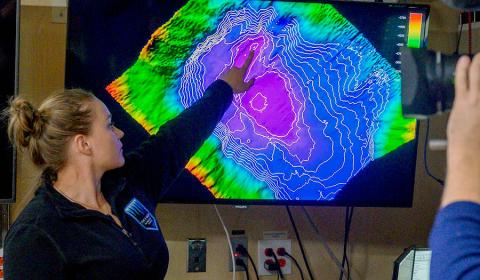
Alumni Spotlight Q & A
Where are you from, Cassie?
I am originally from Texas.
What was your major at UNH and who was your adviser?
M.S. in Environmental Sciences, Ocean Mapping; I graduated in Dec 2018, and my adviser was Dr. Tom Lippmann.
Why did you choose UNH?
UNH has the best Ocean Mapping program in the country at EOS' Center for Coastal and Ocean Mapping.
What were your favorite courses and why?
I loved the Intro to Ocean Mapping courses because that's what I really wanted to learn about.
What was student life like and what did you think of the extracurricular activities?
Graduate student life is not like undergrad; there are only so many groups and extracurricular activities to join, but also not enough time to really join. Graduate student life was more like a 9–5 job, except it went much longer than 9–5 and usually some portion of your weekends. This is why it is really important to love what you're learning about.
What was the biggest transitional issue you faced when you started at UNH?
The weather – I'm originally from Texas and went to undergrad in Seattle, WA so I had never lived in a place with snow.
What is your current position and why is your work important?
I'm a marine geologist leading a small team of mappers at the University of Texas in Austin. Every day is different and challenging in its own way. I love that I get to have the time and space to deep dive into a project and work through all the geophysical analyses that I haven't been able to do in previous positions. Our work is extremely important for any number of reasons – personal safety via accurate nautical charts, a better understanding of Earth's processes through exploration, high-resolution bathymetry and video from hard-to-access places, and knowledgeable analyses (a perfect example comes from fellow UNH CCOM alumni Shannon Hoy and the recent Okeanos Explorer's ROV dives), and simply to fill in the gaps (since the world's oceans are only 24% mapped).

What are your future career plans?
I hope to continue building out my current mapping group, and also (one day) start my own company with other amazing scientists I've been fortunate to work with and know.
How did UNH contribute to your career and where you are now? Looking back on your time spent as a UNH grad student, what are some of your best memories?
UNH directly prepared me for my career through the coursework and mentorship the CCOM faculty provided. They also made the connection for me and my last employer that allowed me to get my first job out of grad school – leading the mapping portion of the Five Deeps Expedition (and later, the Ring of Fire Expedition). Their support and guidance also allowed me to provide opportunities to other UNH grads with my previous position.
I really loved my cohort and my fellow CCOM graduate students – we always found a way to make things fun; friends for life for sure.
Any advice for undergrads/grad students who are conducting research?
Don't be afraid to stand up for your work and push your own agenda to your advisor or committee – it is your work, your future, and learning to stand up for yourself and your work will be a useful skill to have later in life.
What was something you would have changed about your graduate research experience? What can be improved so that other students conducting research have an improved experience?
I genuinely feel that there needs to be more transparency to undergrads and incoming grad students about the graduate school application process, what it really means to be a graduate student, and the extreme importance for graduate students to be honest when undergrads ask questions about the process or potential mentors. So many people have ended up in less than ideal situations that could've been avoided if there was more transparency about the whole process. This includes how you go about finding an advisor within your department if you don't come in with one, clearly defining with your advisor what the goals of your project are, etc. These are important life skills you are expected to just know, but some don't have the confidence to develop these skills nor the guidance to support it.
"Don't be afraid to stand up for your work and push your own agenda to your advisor or committee – it is your work, your future, and learning to stand up for yourself and your work will be a useful skill to have later in life."
What makes you proud to be affiliated with UNH?
I loved the opportunity to get to know the current and future leaders in ocean mapping; especially the GEBCO students from around the world. It was such a great experience and I was so lucky to get to work with a lot of them again during my first job post UNH graduation.
What impact do you hope your work has on future generations?
I'm not sure my work has reached a wide enough audience to make a significant impact, but I hope that the work of all ocean mappers can inspire future generations to be curious about the unknown and bolster a sense of adventure.
Are you on social media and do you have any other links to share?
- You can find me on Instagram
- I am also featured in this Ocean Mapping video by the Paul Allen Group and Sarah Menzies
- A great article in the New Yorker; Thirty-six Thousand Feet Under the Sea
- High-resolution multibeam sonar bathymetry of the deepest place in each ocean
- Identifying Future Hydrographic Survey Priorities: A Quantitative Uncertainty Based Approach
pursue a degree in Ocean Mapping
Are you or is someone you know an alum who conducted research with us? Want to be featured in an upcoming Alumni Spotlight? We'd love to connect! Please email Rebecca.Irelan@unh.edu with details.